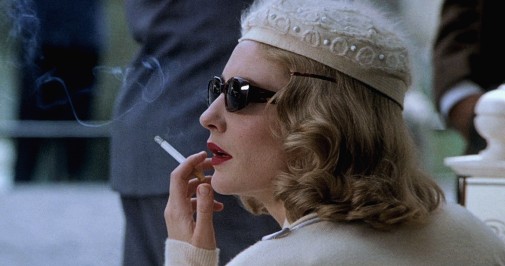
Guillermo del Toro's Nightmare Alley is now in theaters, bringing Cate Blanchett back to the big screen where she belongs. Playing a manipulative psychologist who proves herself a femme fatale, the Australian actress is sure to bring glamour to the part, dazzling audiences as she's been doing for decades. To commemorate the occasion, this week's Almost There entry revisits one of Cate Blanchett's best performances. In fact. It might be her greatest. In any case, it's my favorite from her sterling filmography, a supporting part she injects with life and patrician heartbreak. The Academy ignored her in 1999, but Blanchett may have come close to a second nomination for her work as Meredith Logue in Anthony Minghella's adaptation of The Talented Mr. Ripley…
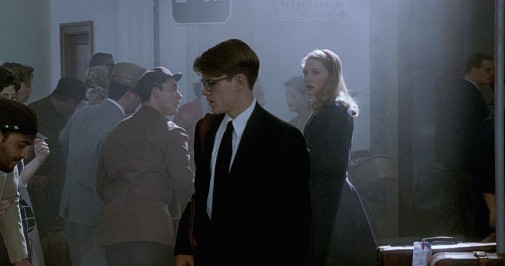
What is it about Cate Blanchett and Patricia Highsmith that makes them such a stellar combination? Maybe it's the sense of strong emotions behind a glass barrier. Perhaps it's the theatricality of midcentury mannerisms. Whatever the case may be, Blanchett has never been better than when bringing that author's novels to the silver screen. Unlike Carol Aird, Meredith Logue wasn't a Highsmith invention. Instead, she was written by Minghella specifically for what he called a Blanchett-type. When the Australian accepted to be part of the film, going from Queen Elizabeth to a supporting role, the delighted director expanded the character further.
Before she becomes vital to the plot, the first glimpse at Meredith helps explain this fascination. From the moment she appears, a gauzy silhouette behind Tom Ripley, the camera is in love with Cate Blanchett and, by consequence, the gauche young heiress on her first trip to Europe. Traveling alone in a strange country, Meredith looks desperate to find a fellow American, looking around, searching. The titular Ripley is the master observer in the narrative, passing for other people, infiltrating the lives of the wealthy, going from underachiever to playboy. Even so, every time he encounters Meredith, she's watching him before he notices her. It's she who starts the conversation, vibrating with the need for companionship, though her attempts at striking connection feel clumsy.
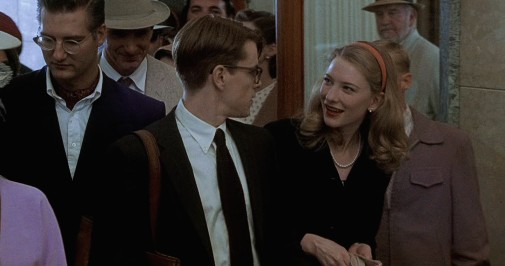
That's what is so disarming about Meredith, as portrayed by Blanchett. Trying to talk about her extensive luggage as a way to find kinship in another member of her social strata, one becomes aware of how gauche Miss Logue can be. She's nervous and unwittingly callous, uncomfortably ingratiating. Yet, there's an openness that makes her hard to resist, a naïveté that smooths over the rough edges and makes them endearing, sweet. Underlining these aspects, Blanchett plays the introduction as a flustered schoolgirl enamored by the sight of a never-handsomer Matt Damon. Pretending to be Dickie Greenleaf, Ripley brushes her off with little thought, but her presence persists in the viewer's mind. The next time we see her much has changed.
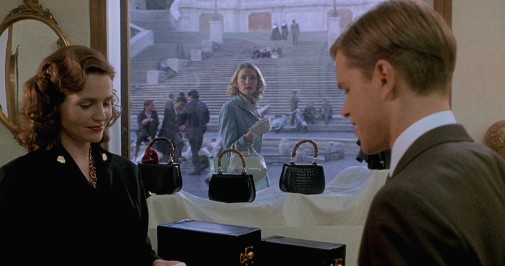

After nearly an hour, after Tom has killed Dickie and assumed his identity, our pernicious anti-hero runs into her again in Rome. More accurately, he's shopping for Gucci goods when she spots him through the window. Meredith quickly pounces on the demon twink like the thirsty gal she is, all smiles and guilelessness. Believing she's talking to an eligible Dickie Greenleaf, Meredith is painfully sincere when talking about herself, trying to forge complicity, maybe more. She confesses to being the kind of rich girl who claims to despise her wealth but couldn't possibly imagine living without it. If you had money your entire life, you're only comfortable around other people who have it. Unlike the real Dickie, the thoughtless Meredith can spout such elitist musings without a trace of bite, of cruelty.
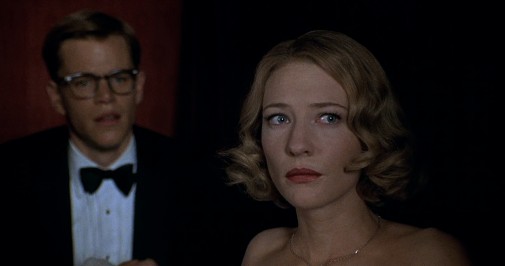

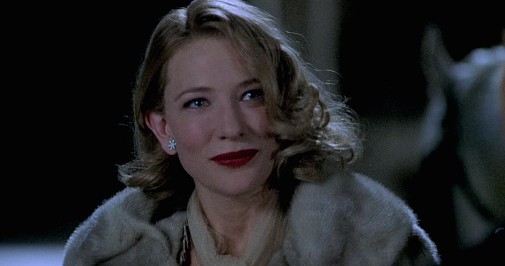
Tom plays the woman like a fiddle, getting her to fall in love with him in no time. Of course, neither Damon nor Blanchett make it seem that hard, not when the heiress is so keen and flustered, so girlish in her naked want. There's that mask of sophistication she always wears along with that coiffed blonde perfection so dramatically flicked off the face. Nevertheless, the mask is transparent, hiding nothing. In a carriage lit by the Roman moon, the mask is nowhere to be seen. She looks so young and innocent, an American princess whose heart is about to be broken by the prince. Still, you should always save heartbreak for daylight, and so they depart with sad smiles and little resolution, setting the stage for Blanchett's most glorious scene. It happens when Meredith meets Gwyneth Paltrow's Marge in a café by the Spanish steps.
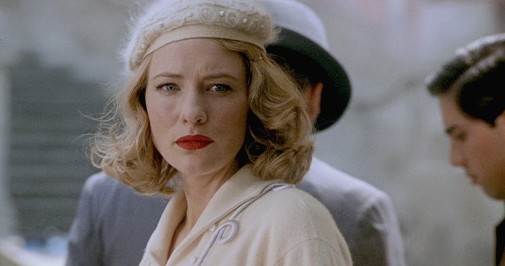

Suddenly, it all comes crashing down for the lovesick rich girl, all according to Ripley's plan. Thinking they're there to meet different people, both women come out of it believing Dickie has been entertaining himself with Meredith while still in love with his former girlfriend. In a storm of embarrassment, the Logue heiress makes excuses and proceeds to leave, convinced she's been part of a love triangle that's not going to resolve itself in her favor. It's a spectacle of shame that's trying to go unnoticed, covered by a red smile and stylish sunglasses. She doesn't convince, her pain too obvious, too latent. Meredith can't hide her feelings well, a constant throughout Blanchett's perfect performance, from the arrival in Italy to the moment she reencounters Tom at the end and unknowingly signs poor Jack Davenport's death sentence. Even then, the tale of fear melting into romance is plain to see, beautifully transparent.
Amid the perversities of Dickie and Tom, the Italian taste for epicurean curiosity, Meredith sticks out like a sore thumb. She's indefatigably American and unwaveringly un-mysterious, no matter how much she tries to transcend those aspects of herself. So much of the performance lives and dies in those failures of social performance. Her gestures are exaggerated and read as overeager even when she's trying to project the cool disinterest of a European seductress. Never natural, she's also never distant in that way Tom can be when separating interior life from the game of shiny surfaces, illusions. However, that doesn't mean Meredith isn't genuine or ever rings false. That's the tragedy of her presence, unable to embody sincerity while being vulnerable at each and every moment.
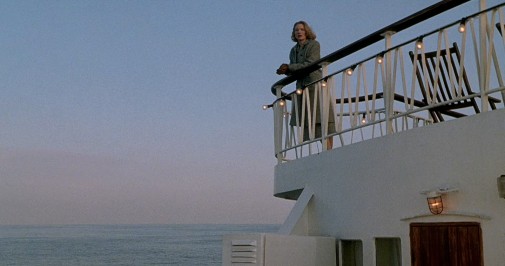
Coming off an awards season that saw many people declare her a robbed queen, Cate Blanchett got some love for her work in The Talented Mr. Ripley. Indeed, BAFTA nominated her for Best Supporting Actress. As for the movie, it earned five Academy Award nominations, though none for the Australian goddess. Instead, the Oscar nominees were Toni Collette in The Sixth Sense, Angelina Jolie in Girl, Interrupted, Catherine Keener in Being John Malkovich, Samantha Morton in Sweet and Lowdown, and Chloë Sevigny in Boys Don't Cry. 1999 was a bloodbath for this category, with many mighty contenders being snubbed. In the end, Jolie was victorious, while Blanchett would have to wait until 2004 for her first Best Supporting Actress nod and, eventually, a win. As far as I'm concerned, Blanchett should have won that little golden guy for the fabulous Meredith Logue.
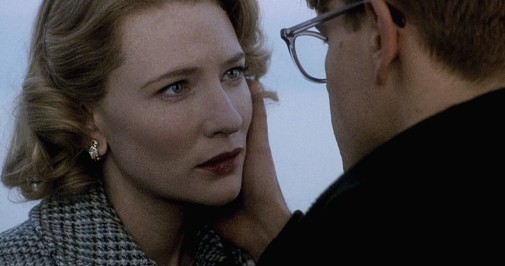
The Talented Mr. Ripley is streaming on Paramount Plus. You can also rent it on several services.